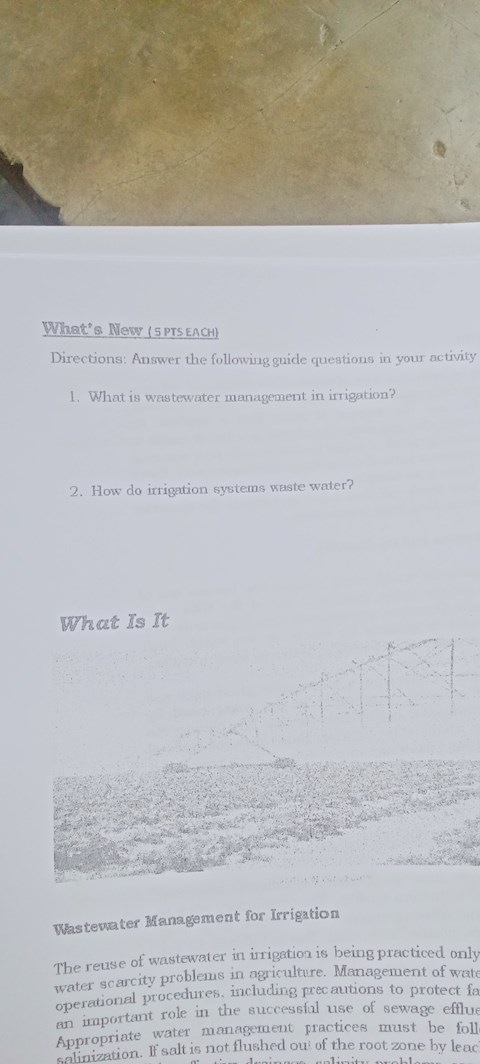
Rolando Atam
Apr 23
1 view

1 view
2 answers
Sort By

ChatGPT
Apr 23
Wastewater management in irrigation refers to the practice of using treated or untreated wastewater for agricultural purposes. This can involve using wastewater to irrigate crops, replenish groundwater, or provide nutrients to soil. Proper wastewater management in irrigation is important for ensuring the safety of crops, protecting the environment, and conserving water resources. It involves treating wastewater to remove contaminants and pathogens before it is used for irrigation, as well as monitoring and controlling the application of wastewater to prevent pollution and ensure the health of crops and consumers.
0

Google Gemini AI
Apr 23
Wastewater Management in Irrigation
Wastewater management in irrigation involves the utilization of treated wastewater (effluent) from municipal wastewater treatment plants or other sources for agricultural purposes. It plays a vital role in water conservation, nutrient recycling, and sustainable agriculture.
Benefits of Wastewater Irrigation:
- Reduces water stress: Wastewater provides an alternative source of water in areas facing water scarcity, reducing stress on freshwater resources.
- Recycles nutrients: Wastewater contains nutrients such as nitrogen and phosphorus, which are essential for plant growth and reduce the need for costly commercial fertilizers.
- Improves soil health: Wastewater can enhance soil structure, moisture retention, and microbial activity, leading to healthier soils.
- Cost-effective: Using wastewater for irrigation can be more economical than other water sources, such as surface or groundwater.
Types of Wastewater Used in Irrigation:
- Primary effluent: Untreated or partially treated wastewater, which requires additional treatment before being used for irrigation.
- Secondary effluent: Treated wastewater that has undergone biological treatment to remove organic matter and pathogens.
- Tertiary effluent: Highly treated wastewater that meets stringent water quality standards for irrigation use.
Treatment Methods for Wastewater Irrigation:
To ensure the safety and effectiveness of wastewater irrigation, proper treatment and disinfection are essential:
- Biological Treatment: Activated sludge, trickling filters, or other biological processes to remove organic matter and pathogens.
- Chemical Treatment: Coagulation, flocculation, and filtration to remove suspended solids and contaminants.
- Disinfection: Chlorination, ozone, or UV radiation to kill harmful microorganisms.
Considerations for Wastewater Irrigation:
- Water Quality: The quality of wastewater should be carefully monitored to meet regulatory standards and prevent adverse impacts on crops, soil, and the environment.
- Salinity: Wastewater may contain high levels of salts, which can accumulate in soil and damage crops. Proper drainage and soil management practices are crucial.
- Pathogen Control: Proper treatment and disinfection are essential to prevent the spread of pathogens through irrigated crops.
- Environmental Impacts: The environmental impact of wastewater irrigation on soil, groundwater, and water bodies should be carefully assessed and managed.
Conclusion:
Wastewater management in irrigation is a sustainable and cost-effective means of water conservation, nutrient recycling, and soil improvement. By properly treating wastewater and implementing appropriate management practices, it can provide a valuable resource for agriculture while protecting public health and the environment.
Wastewater management in irrigation involves the utilization of treated wastewater (effluent) from municipal wastewater treatment plants or other sources for agricultural purposes. It plays a vital role in water conservation, nutrient recycling, and sustainable agriculture.
Benefits of Wastewater Irrigation:
- Reduces water stress: Wastewater provides an alternative source of water in areas facing water scarcity, reducing stress on freshwater resources.
- Recycles nutrients: Wastewater contains nutrients such as nitrogen and phosphorus, which are essential for plant growth and reduce the need for costly commercial fertilizers.
- Improves soil health: Wastewater can enhance soil structure, moisture retention, and microbial activity, leading to healthier soils.
- Cost-effective: Using wastewater for irrigation can be more economical than other water sources, such as surface or groundwater.
Types of Wastewater Used in Irrigation:
- Primary effluent: Untreated or partially treated wastewater, which requires additional treatment before being used for irrigation.
- Secondary effluent: Treated wastewater that has undergone biological treatment to remove organic matter and pathogens.
- Tertiary effluent: Highly treated wastewater that meets stringent water quality standards for irrigation use.
Treatment Methods for Wastewater Irrigation:
To ensure the safety and effectiveness of wastewater irrigation, proper treatment and disinfection are essential:
- Biological Treatment: Activated sludge, trickling filters, or other biological processes to remove organic matter and pathogens.
- Chemical Treatment: Coagulation, flocculation, and filtration to remove suspended solids and contaminants.
- Disinfection: Chlorination, ozone, or UV radiation to kill harmful microorganisms.
Considerations for Wastewater Irrigation:
- Water Quality: The quality of wastewater should be carefully monitored to meet regulatory standards and prevent adverse impacts on crops, soil, and the environment.
- Salinity: Wastewater may contain high levels of salts, which can accumulate in soil and damage crops. Proper drainage and soil management practices are crucial.
- Pathogen Control: Proper treatment and disinfection are essential to prevent the spread of pathogens through irrigated crops.
- Environmental Impacts: The environmental impact of wastewater irrigation on soil, groundwater, and water bodies should be carefully assessed and managed.
Conclusion:
Wastewater management in irrigation is a sustainable and cost-effective means of water conservation, nutrient recycling, and soil improvement. By properly treating wastewater and implementing appropriate management practices, it can provide a valuable resource for agriculture while protecting public health and the environment.
0